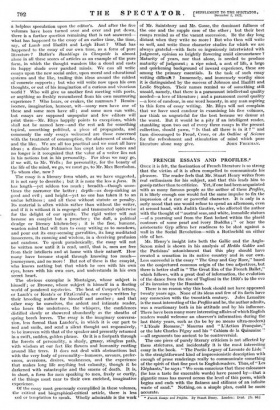FRENCH ESSAYS AND PROFILES.* ONCE it is felt, the fascination
of French literature is so strong that the victim of it is often compelled to communicate his pleasure. The reader feels that Mr. Stuart Henry writes from real enthusiasm for his subject, and that this leads him to gossip rather than to criticize. Yet, if one had been acquainted with as many famous people as the author of these Profiles, it is likely enough one would feel the same impulse to fix the impression of a rare or powerful character. It is only in a surly mood that one would refuse to spend an afternoon, even at second hand, with Judith Gautier, who affected the author with the thought of "austral seas, and white, immobile statues —of a yearning soul from the East locked within the placid contours of some pearl and ivory Buddha ; " or hear the aristocratic Gyp affirm her readiness to be shot against a wall in the Social Revolution—with a Rothschild on either side of her.
Mr. Henry's insight into both the Gallic and the Anglo- Saxon mind is shown in his analysis of Hedda Gabler and the Parisians' astonishment that this play should have created a sensation in its native country and in our own. Less successful is the essay "The Gray and Gay Race," based on the conjectured common origin of the two adjectives, but there is better stuff in "The Great Era of the French Ballet," which follows, with a great deal of information, the evolution of the dance from the rise of Taglioni in the 1830's to the eve of its invasion by the Russians.
There is no reason why this book should not have appeared twenty years ago. None of its ideas and few of its facts have any connexion with the twentieth century. Jules Lemaitre is the most interesting of the Profiles and he, the author admits, was a reactionary both in his attitude and by his influence. There have been many more interesting affairs of which English readers would welcome an observer's information during the last thirty years, such as (to be by no means ultra-modern) " L'Ecole Romane," Maurras and " L'Action Franraise," or the late Charles Peguy and his " Cahiers dc la Quinzaine " —all arguments too ancient to be controversial.
The one piece of purely literary criticism is not affected by these strictures, and incidentally it is the most interesting essay in the book. "The Poetic Legacy of Leconte de Lisle" is the straightforward kind of impressionistic description with enough of prose renderings really to communicate something of the spirit of that fine poet to English readers. Thus, of "Les Elephants," he says : "We seem conscious that these colossuses (he has a taste for execrable words) have passed by—that a gigantic mass has moved across the level of this poem, which begins and ends with the flatness and stillness of an infinite waste of sand." Nothing, on a simple plan, could be more accurate.
• French Essays and Profiles. By Stuart Henry. London: Dent. Us. Oda






































































 Previous page
Previous page